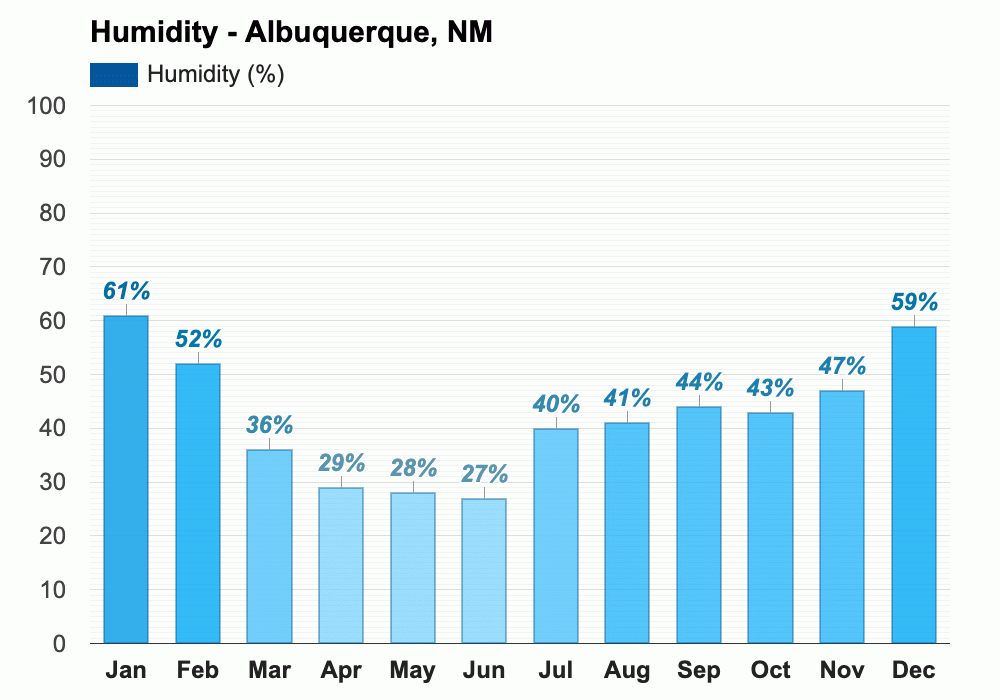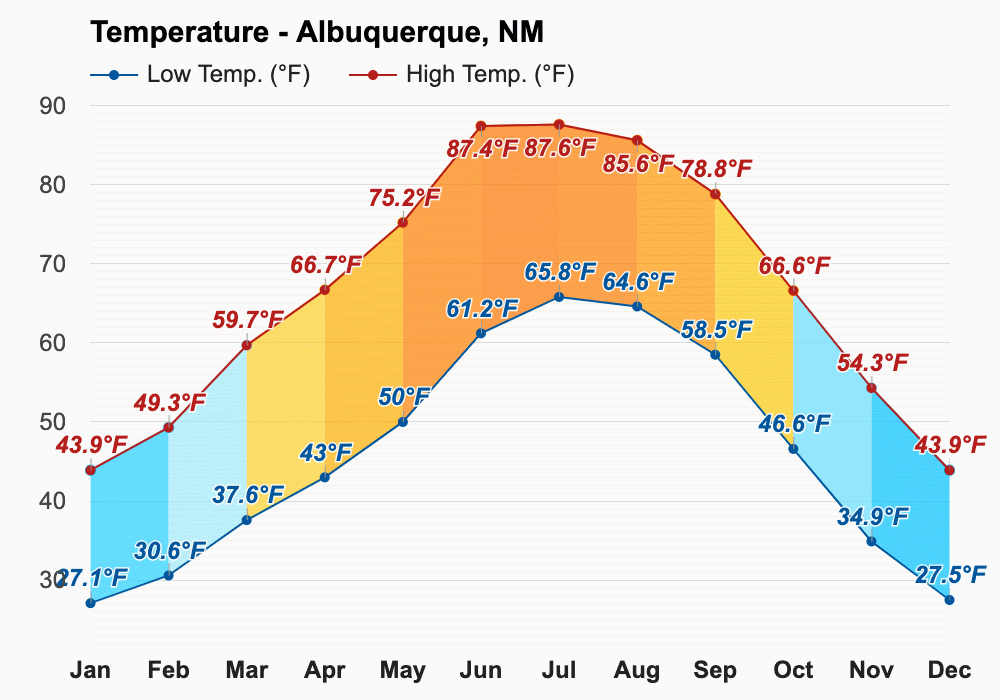Albuquerque New Mexico Average Weather: A Comprehensive Guide
Understanding the average weather in Albuquerque, New Mexico, is essential for anyone planning to visit or live in this vibrant city. Whether you're a tourist exploring the scenic landscapes or a prospective resident considering relocation, knowing the climate patterns will enhance your experience. Albuquerque's unique geography and high desert environment contribute to its distinct weather conditions, which we will explore in detail.
Located in the heart of the American Southwest, Albuquerque offers a blend of warm summers, mild winters, and plenty of sunshine throughout the year. This article will provide an in-depth look at the city's weather patterns, seasonal variations, and how they impact daily life. By the end, you'll have a comprehensive understanding of what to expect when visiting or living in Albuquerque.
Our goal is to equip you with reliable information about Albuquerque's average weather, ensuring you're prepared for any outdoor activities, travel plans, or long-term living decisions. Let's dive into the details and uncover what makes Albuquerque's climate so fascinating.
Read also:Juliana Margulies A Comprehensive Look At Her Life Career And Legacy
Table of Contents
- Geography and Climate Overview
- Seasonal Weather Patterns
- Spring in Albuquerque
- Summer Weather
- Fall Weather
- Winter Conditions
- Average Temperature Trends
- Precipitation and Rainfall
- Extreme Weather Events
- Travel Tips for Different Seasons
Geography and Climate Overview
Albuquerque, New Mexico, is situated in the central part of the state, nestled along the Rio Grande River. The city's elevation ranges from 4,900 to 5,300 feet above sea level, contributing to its high desert climate. This geographical setting results in dry air, significant temperature variations between day and night, and abundant sunshine.
Albuquerque experiences a semi-arid climate, classified under the Köppen climate system as BSk. This classification reflects the city's low annual precipitation and distinct seasonal changes. The surrounding Sandia Mountains to the east and the Rio Grande Valley to the west further influence local weather patterns, creating a microclimate unique to the area.
Key Features of Albuquerque's Climate
- High elevation leading to cooler temperatures compared to lower-altitude regions.
- Abundant sunshine with over 250 sunny days per year.
- Low humidity levels, typical of desert climates.
- Distinct seasonal variations with warm summers and mild winters.
Seasonal Weather Patterns
Albuquerque's weather is characterized by four distinct seasons, each offering unique experiences and conditions. Understanding these seasonal variations is crucial for planning outdoor activities, travel, or daily routines.
Spring in Albuquerque
Spring in Albuquerque typically begins in March and lasts until May. This season is marked by mild temperatures, blooming vegetation, and occasional windy conditions. Daytime highs average between 60°F and 75°F, while nighttime lows range from 35°F to 50°F.
One notable feature of spring in Albuquerque is the strong winds, often referred to as the "windy season." These winds can reach speeds of 20-30 mph, making it essential to secure loose items and plan accordingly for outdoor activities.
Summer Weather
Summer in Albuquerque is warm and dry, with temperatures peaking in July and August. Daytime highs often exceed 90°F, but the low humidity makes the heat more bearable compared to humid regions. Nights remain relatively cool, with temperatures dropping to around 60°F.
Read also:Halloween H20 Cast A Comprehensive Look At The Stars Who Brought Horror To Life
The monsoon season, which typically occurs from mid-July to early September, brings periodic rainfall and thunderstorms. These storms provide much-needed moisture to the arid landscape and create stunning lightning displays.
Fall Weather
Fall in Albuquerque is a favorite season for many residents and visitors alike. The weather cools down significantly, with daytime temperatures ranging from 60°F to 80°F and nighttime lows between 30°F and 50°F. The clear skies and crisp air make it an ideal time for outdoor activities such as hiking and biking.
Another highlight of fall is the vibrant foliage in the surrounding mountains, particularly the Sandia Mountains, where aspen trees turn brilliant shades of yellow and orange.
Winter Conditions
Winter in Albuquerque is generally mild, with temperatures rarely dropping below freezing. Daytime highs average between 40°F and 50°F, while nighttime lows hover around 20°F to 30°F. Snowfall is minimal in the city, but the Sandia Mountains receive enough snow for skiing and snowboarding.
Winter in Albuquerque is also known for its clear, sunny skies, making it a great time for outdoor enthusiasts who enjoy activities like snowshoeing or cross-country skiing in the nearby mountains.
Average Temperature Trends
Albuquerque's average temperatures vary significantly throughout the year, reflecting the city's distinct seasonal changes. The table below provides an overview of monthly average high and low temperatures:
| Month | Average High (°F) | Average Low (°F) |
|---|---|---|
| January | 50 | 25 |
| February | 55 | 28 |
| March | 60 | 33 |
| April | 70 | 40 |
| May | 80 | 48 |
| June | 90 | 55 |
| July | 92 | 60 |
| August | 90 | 60 |
| September | 85 | 52 |
| October | 75 | 42 |
| November | 60 | 30 |
| December | 50 | 25 |
Precipitation and Rainfall
Albuquerque receives an average of 9 inches of precipitation annually, with most of it occurring during the summer monsoon season. The table below outlines the monthly precipitation trends:
| Month | Average Precipitation (inches) |
|---|---|
| January | 0.5 |
| February | 0.4 |
| March | 0.5 |
| April | 0.4 |
| May | 0.5 |
| June | 0.6 |
| July | 1.5 |
| August | 1.4 |
| September | 1.0 |
| October | 0.5 |
| November | 0.4 |
| December | 0.5 |
Extreme Weather Events
While Albuquerque's climate is generally mild, the city occasionally experiences extreme weather events. These include:
- Severe Thunderstorms: During the summer monsoon season, thunderstorms can produce heavy rainfall, hail, and occasional tornadoes.
- Dust Storms: Strong winds can lead to dust storms, especially during the spring months.
- Flash Flooding: Heavy rainfall in arroyos and dry riverbeds can cause flash flooding in certain areas.
- Heat Waves: Prolonged periods of high temperatures can occur during the summer, posing health risks to vulnerable populations.
Travel Tips for Different Seasons
Planning a trip to Albuquerque? Here are some tips for each season:
Spring Travel Tips
- Be prepared for windy conditions by wearing layers and securing loose items.
- Enjoy the blooming wildflowers and outdoor festivals.
- Book accommodations early, as spring is a popular time for visitors.
Summer Travel Tips
- Stay hydrated and wear sunscreen due to the intense sun and low humidity.
- Plan outdoor activities in the early morning or late afternoon to avoid the midday heat.
- Experience the summer monsoon season by watching the dramatic lightning storms.
Fall Travel Tips
- Take advantage of the pleasant weather for hiking and biking in the Sandia Mountains.
- Attend local events such as the Albuquerque International Balloon Fiesta.
- Enjoy the vibrant fall foliage in the surrounding areas.
Winter Travel Tips
- Bring warm clothing for nighttime activities, as temperatures can drop significantly.
- Visit the Sandia Mountains for skiing and snowboarding opportunities.
- Experience the serene beauty of a winter morning with clear skies and crisp air.
Kesimpulan
In conclusion, Albuquerque, New Mexico, offers a diverse and fascinating climate with distinct seasonal variations. From the mild winters to the warm summers, the city provides a unique experience for residents and visitors alike. Understanding the average weather patterns, including temperature trends, precipitation, and extreme weather events, will help you plan your activities and make the most of your time in Albuquerque.
We encourage you to share this article with others who may find it useful and leave a comment below if you have any questions or additional insights about Albuquerque's weather. For more information on travel and living in Albuquerque, explore our other articles on the site.


